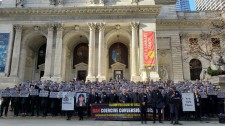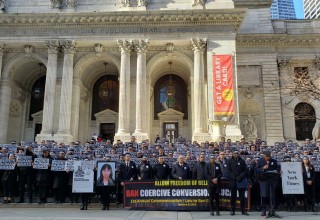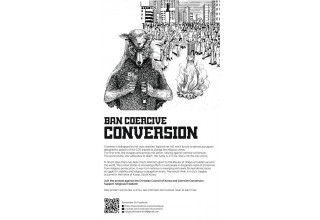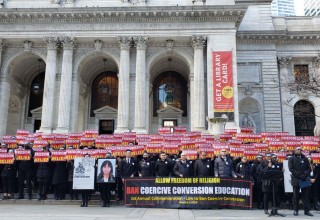Activists Mobilize in Midtown Manhattan to Ban Coercive Conversion

NEW YORK, January 6, 2019 (Newswire.com) - On Sunday, Jan. 6, human rights activists and religious leaders joined together in Midtown Manhattan to take a stand against coercive conversion. According to Cheonji News, supporters of religious freedom from secular and religious sectors commemorated the life of the late Ji-In Gu, a young South Korean woman who fell victim to violent practices associated with coercive conversion.
Ji-In Gu was abducted on two separate occasions and forced to participate in a conversion program. After escaping her first kidnapping, she worked to raise awareness of the severity of coercive conversion by drafting a petition and submitting it to the South Korean government. In December 2017, she was captured again and eventually died of cardiac arrest when she was forced to attend a conversion program in the province of South Jeolla-Do. After her death, supporters avidly collected signatures for her petition, which demanded that the government establish a legal framework that criminalizes religion-based violence. More than 100,000 signatures have been collected and uploaded online. Over a year has passed and so far, no official statement regarding the petition has been released.
Ministers do not hesitate to arrange coercive conversion programs due to the lucrative nature and lack of legal repercussions.
Sang Ik Park, HAC representative
According to the Human Rights Association for Victims of Coercive Conversion (HAC), more than 150 cases of coercive conversion have been reported since the death of Ji-In Gu. The HAC has reached out to advocacy groups worldwide to raise awareness of the violation of human rights taking place in South Korea. In late November, a full-page New York Times advertisement titled "Ban Coercive Conversion" was published to support the cause. The ad featured a close-up of a greedy religious leader depicted as a wolf and a young girl being burned at a stake in the distance. HAC representative Sang Ik Park explains, "Ministers do not hesitate to arrange coercive conversion programs due to the lucrative nature and lack of legal repercussions."
Human rights advocates hope international media attention will act as a catalyst for change. Major media networks covered the event and human rights activists expect that the South Korean government will soon no longer be able to turn a blind eye to the senseless violence occurring in its communities. Over 20 countries worldwide hosted rallies on Jan. 6 to raise awareness of the unjust practice of coercive conversion and gain the support needed to finally put it to an end.


